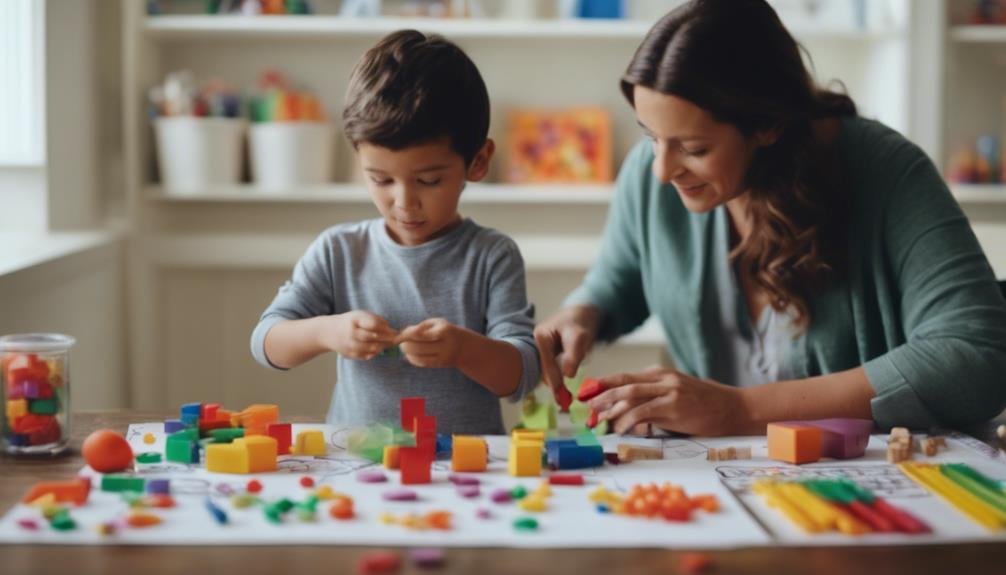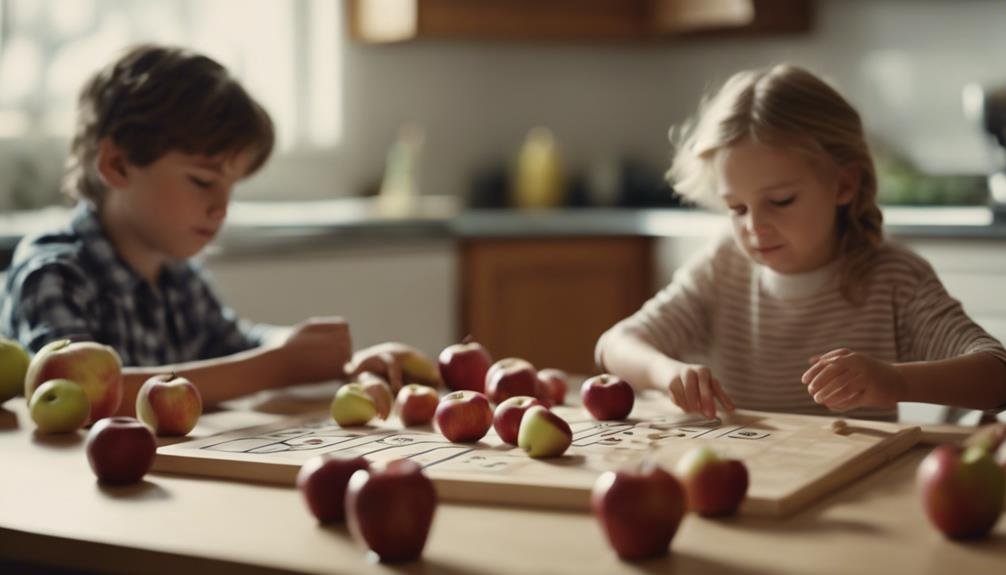"Cherishing Little Steps - A Haven for Baby and Family Journeys"
Tips for Teaching Your Child Basic Math Concepts
Are you looking for practical ways to help your child grasp basic math concepts effortlessly? Understanding foundational math skills is essential for your child's academic success.
By incorporating simple yet effective strategies, you can make learning math an engaging and enjoyable experience for your child. Discover how you can enhance your child's math skills through everyday activities and interactive methods that foster a love for numbers.
Key Takeaways
- Start early: Introduce math concepts from a young age for cognitive development.
- Make it practical: Use everyday objects to make math tangible and relatable.
- Apply math in daily life: Incorporate math into activities like cooking and shopping.
- Keep it fun: Engage children with interactive games and visual aids for better understanding.
Importance of Early Math Exposure

Why is early exposure to math essential for your child's development?
Building foundations in math from a young age is critical for your child's cognitive development. Introducing math concepts early on helps your child develop problem-solving skills, critical thinking abilities, and a strong numerical foundation that will benefit them throughout their academic journey and beyond.
By exposing your child to math at an early age, you're laying the groundwork for a deeper understanding of mathematical concepts in the future. This early exposure helps children develop essential skills such as logical reasoning, pattern recognition, and the ability to think analytically. These skills not only improve their math proficiency but also enhance their overall cognitive abilities.
Furthermore, early math exposure can boost your child's confidence when tackling more complex mathematical problems later on. It sets a positive tone for their relationship with math and opens the door to a world of possibilities in various fields that require strong quantitative skills. Embracing math from an early age is truly an investment in your child's future success.
Utilizing Everyday Objects for Math
To enhance your child's understanding of math concepts, consider incorporating everyday objects into their learning activities. Household items can be powerful tools for hands-on learning experiences that make math more engaging and relatable for your child. You can use items such as fruits, toys, measuring cups, or even socks to introduce and reinforce various mathematical concepts.
For instance, you can use fruits like apples or oranges to teach addition and subtraction. Let your child practice by adding two apples to three apples or subtracting one orange from four oranges. This hands-on approach not only makes learning fun but also helps in visualizing mathematical operations.
In addition, you can utilize measuring cups to teach fractions. Show your child that half a cup plus another half makes a whole cup. This practical demonstration with household items can enhance your child's comprehension of fractions.
Incorporating Math Into Daily Activities

To make math a seamless part of your child's daily routine, you can easily integrate numerical concepts into their everyday activities. Here are some engaging ways to incorporate math into daily life:
- Math in cooking: Involve your child in measuring ingredients, adjusting recipes, and understanding fractions while baking or cooking together. This hands-on experience not only teaches them math skills but also enhances their interest in creating delicious meals.
- Math in shopping: Take your child along for grocery shopping and involve them in activities like comparing prices, calculating discounts, or estimating the total cost of items in the cart. This practical application of math in a real-world setting will help them understand the value of numbers and money.
- Math in storytelling: Encourage your child to create their own stories with numerical elements, such as counting characters, measuring distances, or solving math-related problems within the plot. This imaginative exercise blends creativity with math, making learning enjoyable and interactive.
Incorporating math into daily activities not only reinforces foundational concepts but also makes learning fun and relevant for your child.
Making Math Fun With Games
Engage your child in learning by infusing math concepts through interactive games that make the subject enjoyable and exciting. Game-based learning is a fantastic way to help your child grasp mathematical concepts in a fun and engaging manner. By incorporating interactive activities into your child's routine, you can make math more accessible and encourage a positive attitude towards learning. Below is a table showcasing some exciting math games you can play with your child:
| Game | Description | Benefits |
|---|---|---|
| Math Bingo | Practice math facts while playing bingo | Improves calculation skills |
| Counting Card Games | Use playing cards to reinforce counting skills | Enhances number recognition |
| Math Scavenger Hunt | Search for items based on math clues | Develops problem-solving abilities |
| Shape Hopscotch | Hop on shapes drawn on the ground | Reinforces shape recognition and motor skills |
| Math Puzzles | Solve puzzles with math problems | Enhances critical thinking and logic skills |
Integrating these games into your child's routine will not only make math more enjoyable but also help them develop essential math skills in a playful way.
Using Visual Aids for Conceptual Understanding

Infuse visual aids into your child's learning to enhance their understanding of mathematical concepts in a more interactive and engaging way. Visual aids can make abstract math ideas more tangible and easier for your child to grasp. Here are some ways to incorporate visual aids and hands-on learning into your child's math education:
- Use Manipulatives: Bring out objects like blocks, beads, or even snacks like cereal to help your child visualize and solve math problems. Manipulatives can make learning math feel like playtime.
- Draw Diagrams: Encourage your child to draw diagrams or pictures to represent math problems. This visual representation can help them see the problem from a different perspective and find solutions more easily.
- Interactive Apps: Explore educational apps that use visual aids to teach math concepts. These apps can provide a fun and interactive way for your child to engage with numbers and math operations.
Encouraging Questions and Exploration
Encouraging your child to ask questions and explore mathematical concepts can foster a deeper understanding and curiosity about numbers and problem-solving. Curiosity cultivation is key in developing a strong foundation in math. Encourage your child to ask 'why' and 'how' when solving problems. This inquisitive mindset will help them grasp concepts more effectively.
Hands-on learning activities are a fantastic way to encourage exploration. Use objects like blocks, coins, or even snacks to make math more tangible and fun. Let your child count, group, and manipulate these items to understand mathematical principles better. This interactive approach makes learning enjoyable and memorable.
As your child explores, be actively involved in their discoveries. Ask open-ended questions to prompt critical thinking and deeper exploration. Celebrate their efforts and encourage them to keep trying. By fostering a curious and explorative mindset through hands-on activities, you're setting the stage for a lifelong love of learning and mathematical understanding.
Celebrating Math Achievements

Celebrate your child's math achievements by acknowledging their hard work and progress in understanding mathematical concepts. Recognizing accomplishments and fostering confidence in your child's math abilities is essential for their overall development.
Here are a few ways you can celebrate and encourage your child's success:
- Celebrate Small Wins: Acknowledge even the smallest achievements in math, such as solving a simple addition problem or understanding a new concept. These small victories build confidence and motivation.
- Create a Math Achievement Wall: Dedicate a space in your home to showcase your child's math accomplishments. Display their math tests with good grades, completed math puzzles, or even a certificate for math improvement. This visual representation of their achievements will boost their self-esteem.
- Plan a Math Celebration: When your child reaches a significant milestone in math, plan a special celebration. It can be as simple as a family pizza night or a trip to their favorite ice cream shop. This celebration will reinforce the idea that hard work in math is valued and worthy of recognition.
Frequently Asked Questions
How Can I Help My Child Overcome Math Anxiety?
To help your child overcome math anxiety, try using calming techniques like deep breathing and positive affirmations. Practice problems together and offer lots of encouragement and patience. Remember, progress takes time and effort.
What Are Some Strategies for Teaching Math to a Child With Learning Disabilities?
When teaching math to a child with learning disabilities, remember to utilize visual aids and a multisensory approach. Provide individualized instruction with positive reinforcement to boost confidence and understanding. You can make math enjoyable and accessible.
How Can I Assess My Child's Progress in Math Without Using Traditional Tests?
To assess your child's progress in math without traditional tests, try using fun activities like math games, real-world challenges, and interactive exercises. These methods make progress monitoring engaging and effective for your child.
Are There Any Online Resources or Apps That Can Help Reinforce Math Concepts?
Engage with interactive games and practice worksheets to reinforce math concepts. Immerse yourself in online resources and apps that make learning fun and effective. Embrace technology to enhance your understanding and skill in mathematics.
How Can I Support My Child's Mathematical Thinking and Problem-Solving Skills at Home?
To support your child's mathematical thinking and problem-solving skills at home, engage in math games and hands-on activities. Connect math to real-world applications and encourage problem-solving techniques. Make learning interactive and fun!
Conclusion
Now that you have these tips for teaching your child basic math concepts, you can start building a strong foundation for their future success.
Remember, Rome wasn't built in a day, so take it one step at a time.
With a little patience and creativity, you can help your child become a math whiz in no time!
So, go forth and conquer those numbers like a boss!


